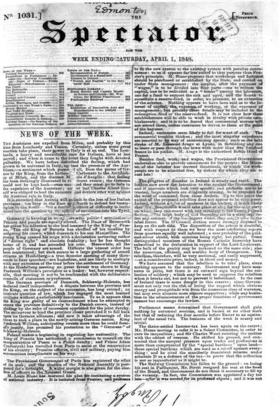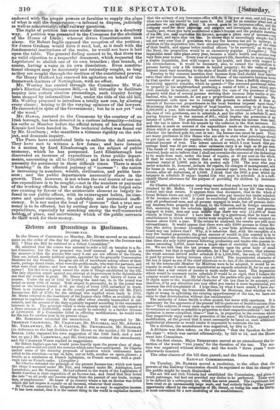Parliament seems determined that Government shall gain nothing by autumnal
sessions, and is busied at no other wurk, but that of reducing the four months before Easter to an equiva- lent of the usual two. The business of the week is scanty and trivial.
The thrice.settled Income-tax has been again on the carpet ; Mr. Hume moving to refer it to a Select Committee, in order to cure its inequalities; and Sir Charles Wood resisting the motion with the oddest of reasons. He shifted his ground, and con- tended that the unequal pressure upon trades and professions is more than compensated by the "special burthens" upon land— those special burthens which are used as a set-off against every- thing : and he cited the manifestly fraudulent returns under schedule D as a defence of the tax—to prove that the collection is not so inquisitorial as it might be. The Railway Commission has fallen to the ground : on losing his seat in Parliament, Mr. Strutt resigned his seat at the head of the Board, and Government do not think it necessary to till up the vacancy. In fact, the Commission was appointed a day too late—after it was needed for its professed objects; and it was not endowed with the proper powers or faculties to supply the place of what is still the desuleratum—a tribunal to dispose, judicially as well as ministerially, of all railway questions. The right of petition has come under discussion in a desultory way. A petition wasted to the Commons for the abolition of the House of Lorrsernwhereat divers Constitntionists took alarm. Sir Robert Inglis opposed the reception of the petition; Sir James Graham would have it read, but, as it dealt with the fundamental institutions of the realm, he would not have it laid upon the table. The general feeling seemed to be, that there was no valid objection to a respectful document, which requested the Legislature to abolish one of its own branches ; that branch, of course, having a voice in its own dissolution. Even constitu- tional changes may be decorously and rationally sought, so long as they are sought through the medium of the constituted powers. Sir Henry Halford has renewed his agitation on behalf of the framework-knitters of Nottingham, with no effect.
Mr. Wortley has carried through the Committee Mr. Wal- pole's Election Recognizances Bill,—a bill virtually to facilitate inquiry into certain election proceedings, such inquiry having been stopped by informalities : but, under the title of the old bill, Mr. Wortley proposed to introduce a totally new one, by altering every clause; hoping to fit the varying opinions of the lawyers. He succeeded in spite of the Government ; but he is not yet out of the wood."
Mr. Hawes, restored to the Commons by the courtesy of an Irish borough, has-been detected in a curious informality—taking his oaths as Member before the official return of his election for Kinsale had been handed in. The technical defect was found out by Mr. Goulburn ; who manifests a virtuous rigidity on the sub- ject, and demands inquiry.
The Peers have contributed little to enliven the dull session. They have met to witness a few forms; and have listened to a motion by Lord Ellenborough on the subject of public economy, which he has postponed. Lord. Ellenborough has discovered an increase of expenditure in three public depart- ments, amounting in all to 110,0001.; and he is struck with the necessity for parsimony in these difficult times. There is much "humbug" in the affected jealousy of "increase" : the nation is increasing in numbers, wealth, civilization, and public busi- ness and the public departments necessarily share in the growth. That, however, is not where the real source of our un- due expenditure is to be sought,—not in the numbers or payment of the working officials, but in the high scale of the larger sala- ries existing by favour of the aristocratic element so largely in- fused in our public offices, with its extravagant habits, its sine- cures and quasi-sinecures, its cadetship and patronized ineffi- ciency. It is not under the head of "increase' that a true eco- nomy is to be effected, but by cutting deep into the body of our expenditure, especially by searching among the well-connected holde&of place, and ascertaining which of the public servants do their work for their-money.



























